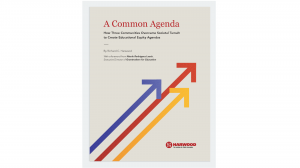Report: How three communities overcame divides to create educational equity agendas
Report stems from engagement between The Harwood Institute and local partners in Reading, PA; Lexington, KY; and Clarksville, TN
“Conventional wisdom is that our country and our communities are too polarized to come together, especially on education,” said Rich Harwood, President and Founder of The Harwood Institute. “But it simply isn’t true. In fact, communities like Reading, Lexington, and Clarksville prove that education can be an issue that brings communities together. This report offers larger lessons to the rest of the country for how we overcome division and generate real action on meaningful issues like education.”
This report details The Harwood Institute’s work with local partners in these three communities, which in each case led to the creation of an educational equity agenda particular to that community. But beyond their particular agenda items, seven common areas of focus were held by at least two, and often all three, communities. This report documents these common agenda items:
--Mental health and youth mentoring
--After- and out-of-school activities
--Pathways for success through and beyond school
--Pre-K and early childhood education
--Teachers who reflect the backgrounds of their students and the community
--Equitable allocation of resources
--Community and student voice
The common agenda items raised in these communities are distinct from typical education debates over Critical Race Theory; Diversity, Equity, and Inclusion initiatives; or equity audits. Moreover, the process by which these agenda items evolved rejected vilifying opponents or pushing people to the fringes.
Importantly, these agendas were not created as a report card on the local public schools. The community-led process by which they came to be was instead a call for communities to take shared responsibility for all young people in the community in partnership with local public schools.
An emphasis on shifting the underlying conditions—what The Harwood Institute calls civic culture—in each community proved key to creating these agendas. The following factors were named as critical to forward movement in crafting, and ultimately acting on, these shared agendas:
--Embracing authentic engagement
--Raising hard issues and making waves
--Developing more connected, trusted leaders
--Making room for new and emerging leaders
--Building catalytic, boundary-spanning entities
--Forging new norms and a sense of shared purpose
--Generating a can-do narrative in the community
Leaders and residents in Reading, Lexington, and Clarksville found a way to get beyond division to create a new agenda for education and the community. They did this by focusing on what matters to people rather than succumbing to manufactured divisions and fear. And in each community, organizations, groups, leaders, and everyday people have stepped forward to turn their equity agendas into concrete action.
At the heart of the stories in this new report from The Harwood Institute is the lesson that communities need not surrender to the narrative of polarization. Communities like Reading, Lexington, and Clarksville are proving there is a more equitable, fair, just, inclusive, and hopeful path forward.
Michael Prihoda
The Harwood Institute for Public Innovation
mprihoda@theharwoodinstitute.org
Visit us on social media:
Facebook
LinkedIn
YouTube
Instagram
Twitter
Legal Disclaimer:
EIN Presswire provides this news content "as is" without warranty of any kind. We do not accept any responsibility or liability for the accuracy, content, images, videos, licenses, completeness, legality, or reliability of the information contained in this article. If you have any complaints or copyright issues related to this article, kindly contact the author above.

